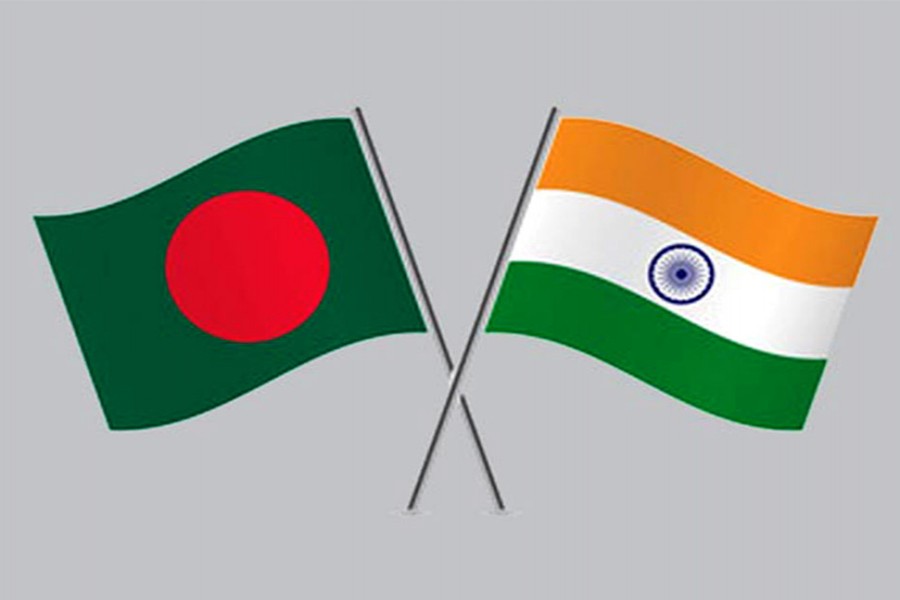Prime Minister Sheikh Hasina is scheduled to make an official visit to New Delhi from October 3-6. This will be her first visit since assuming office for the third consecutive term in January 2019. The purpose of her visit is mainly to meet with her Indian counterpart Narendra Modi to discuss bilateral issues. She is also scheduled to address the World Economic Forum's India Economic Summit.
The past decade has witnessed far-reaching economic and diplomatic engagements between Bangladesh and India. High-level exchanges between the two countries to promote cooperation, security and economic development have been quite frequent. Mainly due to historical linkages and geographical, economic and political determinants, Bangladesh has given high priority to its relations with India.
Moreover, as the world's eighth-largest country in terms of population (164.7 million) with a growing middle class and impressive GDP (gross domestic product) growth of over 6.5 per cent during the last decade, Bangladesh is geo-strategically and economically crucial to India.
Dhaka and New Delhi have been implementing over 100 deals and agreements to bolster foreign policy, defence, security, people-to-people ties, connectivity, and economic relations. The two countries have also amicably resolved quite a few challenging issues. For instance, the 1996 December agreement in New Delhi between former Indian Prime Minister H.D. Deve Gowda, and Sheikh Hasina on sharing the Ganges waters was a milestone.
Also significant was the ratification of the historic Land Boundary Agreement (LBA) between the two countries in June 2015. The LBA accord swapped Indian enclaves within Bangladesh in return for Bangladesh enclaves in India. Accordingly, India received 51 Bangladeshi enclaves covering a total area of 7,110 acres, while Bangladesh obtained 111 Indian enclaves covering an area of 17,160 acres. The Agreement also settled the question of citizenship for about 53,000 residents of those enclaves.
To facilitate trade between the two countries, the India-Bangladesh Trade Agreement was renewed in June 2015. Bangladesh remains India's biggest trade partner in South Asia. Bilateral trade stood at US$9.5 billion in 2017-18. Although Bangladesh's exports to India have gradually increased over the years -- currently amounting to $1.25 billion, there exists huge trade deficit.
India has provided duty-free and quota-free market access to Bangladesh in 2011, still massive trade imbalance continues. In order to reduce trade deficits, India needs to make more investment in Bangladesh and consider removing some of the trade-distorting non-tariff barriers.
PM Hasina last visited India in May 2018 to formally inaugurate the Bangladesh Bhavan at the Visva-Bharati University in Santiniketan, West Bengal. At that event, PM Narendra Modi termed the current phase of bilateral relation a "golden chapter."
But the "golden chapter" seems to have been dented due to lack of tangible actions by New Delhi as regards some of Bangladesh's core concerns. New Delhi has been providing "assurances" for reducing colossal trade deficits and sharing of the Teesta river waters.
Notably, former Indian PM Dr. Manmohan Singh, despite his intent, failed to deliver the mutually agreed deal on Teesta during his visit to Dhaka in 2011 due to West Bengal Chief Minister Mamata Banerjee's opposition. It was embarrassing for New Delhi and a significant setback for Dhaka.
Manmohan's successor, Modi who visited Bangladesh in June 2015 also assured early resolution of the Teesta water sharing issue. The Indian External Affairs Minister Subrahmanyam Jaishankar who visited Dhaka last August expressed New Delhi's desire to find a "mutually acceptable" formula to share the waters of the 54 common rivers and reiterated the "unchanged" promise to resolving the Teesta issue.
Bangladesh and India signed an extradition treaty in January 2013 and concluded another deal to relax business visa limits between the two countries. The extradition treaty helped India take back ULFA militant leader Anup Chetia detained in Bangladesh since 1997. Thus Bangladesh facilitated India to crack down on insurgent groups of the northeast region operating from its territory.
Yet again, Bangladesh has provided India the much needed transit and transshipment facilities with remarkably minimal fees. Also, as a "good will gesture" it permitted the transportation through Bangladesh 7,297 tonnes of power plant equipment in 2011 and 19,537 tons of rice on "humanitarian grounds" in 2015 from Kolkata to Agartala without any charge.
And, last but not least, when India in controversial move revoked the special status granted to Jammu and Kashmir on August 05 last, Bangladesh played it cool and described this as an "internal matter" of India.
Besides the unresolved Teesta issue, one more potential problem has just emerged with the release of the final count of the National Register of Citizens (NRC) in Assam on August 31 that has stripped about 1.9 million people of their citizenship. Although the Indian External Affairs Minister Jaishankar described it as an "internal matter" of India, intense anti-Bangladesh rhetoric centring NRC continues in India.
To conclude, Dhaka's concern over growing trade deficit, equitable sharing of Teesta waters and politically-driven NRC issue needs to be addressed by New Delhi for further deepening mutual relations. The upcoming visit of Bangladesh Prime Minister to New Delhi will provide an opportunity that should not be missed.
Dr Kamal Uddin Ahmed is a former Professor and Chairman, Department of Political Science, University of Dhaka.
[email protected]


